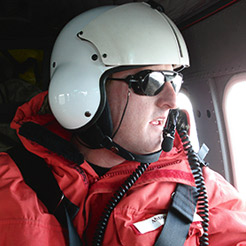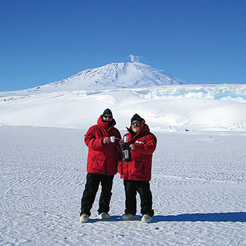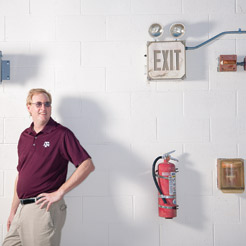
Nearly every winter for the last 12 years, Andrew Klein ’90 has taken the same trip. Sometime before Thanksgiving he flies to Christchurch, New Zealand, then hops a military plane bound for McMurdo Station, the U.S. scientific research base located on the southern tip of Antarctica’s Ross Island.
Klein starts by describing his month-long home in clinical terms: “Basically, it’s a big gas station,” he says, dryly. “Most scientists come there to get equipment and get flown out to do their research.” But it doesn’t take long before Klein begins waxing poetic about Antarctica, the focus of his considerable brainpower for much of his professional life. “There are only two places I ever got off a plane and said, ‘Wow,’” he admits. “Antarctica is one of them. The landscape is amazing. It’s all white. And there’s a 14,000-foot volcano smoking away in the background.”
Klein’s interest in the icy continent began while he was majoring in geology at Macalester. His senior thesis, advised by the late geology professor Jerry Webbers, focused on remote sensing of Antarctic geology. This was in the ’80s, well before Google Earth, and Webbers and Klein were working with technology still in its infancy.
 “It was an ambitious project because Jerry was relatively inexperienced with the hardware and Andrew was just a student,” recalls geology professor John Craddock ’80, who joined the faculty during Klein’s senior year. Recalling the hours the two put into the project, Craddock says: “At first they flailed away at the system until they figured out how to make it work. The software wasn’t user friendly. You had to do a certain amount of programming to work with it.”
“It was an ambitious project because Jerry was relatively inexperienced with the hardware and Andrew was just a student,” recalls geology professor John Craddock ’80, who joined the faculty during Klein’s senior year. Recalling the hours the two put into the project, Craddock says: “At first they flailed away at the system until they figured out how to make it work. The software wasn’t user friendly. You had to do a certain amount of programming to work with it.”
But all the flailing was worth it, Craddock adds. Experience with this important new technology set Klein apart from the academic pack: “This project was a game changer for Andrew, because after graduation he was scooped up by Cornell, and since then it has been his thing.”
At Cornell, Klein completed a PhD in geological sciences and a post-doc at NASA’s Goddard Space Flight Center before being hired by the geography department at Texas A&M University in 1997.
Klein has lived in the Lone Star State long enough now to speak with a hint of a drawl. He loves his work, his students, and the support he gets from the department, but the native Midwesterner admits that adjusting to his new home in College Station, Texas, took time. “It’s really hot here in the summer,” he says. “Maybe that’s why I spend so much time in Antarctica.”
His first trip to the South Pole was in 1999, when Klein began the research that he continues to this day: collecting soil samples to test for human contaminates such as hydrocarbons and metals. As part of the Antarctic Treaty, the soil samples that his team collects are analyzed to measure the human impact on one of the world’s most pristine environments.
Under the treaty, Klein explains, “if you have an activity that makes more than a minor or transient impact on the environment it’s supposed to be monitored.” So the U.S. government hired Klein and his colleagues to monitor impact from McMurdo Station and determine what’s happening over time. Every year since 1999, he has returned to collect more samples.
Happily, the human impact on Antarctica, his research shows, has not increased over the decade-plus that Klein has pulled soil samples there. As the largest base on the continent, McMurdo is home to as many as 1,300 people during the summer and about 200 during the cold, dark winter. “Until the 1980s, standard waste practices in Antarctica were not stringent,” Klein says. “Now all the waste created at the base is either consumed or brought back to the U.S. And there has been a lot of cleanup of past environmental problems.”
To spread the word about their research to the next generation of scientists, the Texas A&M team regularly interacts online with schoolchildren. They’ve even brought teachers along on a few trips to report back to students. “The goal is to interest kids in things that they wouldn’t normally see,” Klein says.
 Stephen Sweet, a geochemical and environmental researcher at Texas A&M, has known Klein since 1999 and accompanied him on most of his Antarctic expeditions. Klein, he says, stands out for “his intelligence, good humor, and dedication to protecting the Antarctic environment.” Spending a month in one of the earth’s most isolated places could be tedious, says Sweet, but Klein makes sure the Texas A&M team has a good time while holed up at McMurdo.
Stephen Sweet, a geochemical and environmental researcher at Texas A&M, has known Klein since 1999 and accompanied him on most of his Antarctic expeditions. Klein, he says, stands out for “his intelligence, good humor, and dedication to protecting the Antarctic environment.” Spending a month in one of the earth’s most isolated places could be tedious, says Sweet, but Klein makes sure the Texas A&M team has a good time while holed up at McMurdo.
Trekking to the South Pole is something Klein hopes to do as long as funding and interest hold out. He believes his research has helped preserve the continent’s environment and his team’s connections with schools have helped spread awareness of how humans can help—or harm—the world’s polar regions.
“I get a lot of satisfaction out of doing my bit to protect the most pristine place in the world,” Klein says. “There’s something that keeps drawing me back.”
St. Paul writer ANDY STEINER ’90 is a regular contributor to Macalester Today.
October 15 2012
Back to top




